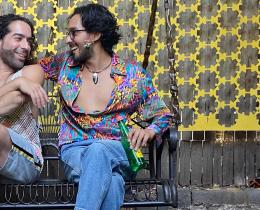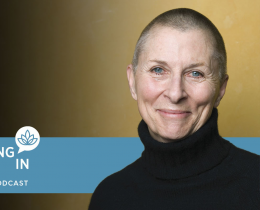Omega: Many people view breakups as a personal failure, rather than an opportunity. Can you speak more about that?
Katherine: There is a cultural assumption that if a relationship ends before one or both people die that the relationship was a failure, and that comes directly from the “happily ever after” myth that we’re collectively aspiring to.
I got really curious about this myth when I was writing Conscious Uncoupling. I researched the myth and I found out it is 400 years old and was created at a time when the lifespan was under 40. Half the children were dying by the age of 16. In that cultural context, it’s really a good idea to keep the parents together.
It’s important to understand the cultural context for some of our assumptions, and in particular this one, because we’re all kind of covertly holding ourselves and others to this standard of lifelong love in order for a relationship to be considered a success.
One of the things I’m trying to get us to collectively rethink is: What are the goals for our relationships that are really appropriate to our time? As much as we all love the "happily ever after" myth, studies indicate that few of us will meet and marry one true love and remain with that person for all of our days.
In fact, statistically, the majority of us will have two or three significant relationships in our lifetime, which implies one or two big breakups as well. Just as we up-level our computer programs, our diets, and even our child-rearing practices according to the latest information, we might also consider updating our relationship goals to be much more realistic to the lives we’re actually living.
Omega: Can you describe the Conscious Uncoupling process? How do we know when it’s time to even engage it? When do we leave a relationship versus trying to work through differences?
Katherine: I’m pro marriage and pro long-term, committed love. Yet, if you are going to separate, there is a kind way to do it and that’s where Conscious Uncoupling comes in.
Most of us are familiar with hostile, nasty breakups. Yet there is a way to break up that is filled with respect, dignity, and honor and which protects the love that initially brought you together. The five steps of Conscious Uncoupling is that path.
I’m not quick to assess that someone needs to break up. In fact, I’m apt to spar a bit with couples that come to me wanting to break up. I try to get them to revalue their relationship and find a way to reconcile.
But the bottom line is that both people need to want it enough to be willing to lean in and work to understand each other, even when one or both people’s values have changed. That is generally one of the biggest challenges in staying together for a lifetime in our post-modern world. People really do change over the course of their lives. Yet often we’re not just changing inside of our existing value system, we’re actually changing value systems.
Is your partner willing and interested in discovering how you’re thinking these days, or are they making you wrong or pulling you to stay the same? It's when people's values have grown so far apart and the partners are no longer interested in learning to allow for those emerging differences in their relationship, that's when many people break up.
If people still have the same value systems, I think it’s better to try to learn how to repair the problems. A lot of new teachings are coming out around attachment theory in that regard and a lot of really wonderful teachers teach core communication skills and how to become capable of having a much healthier connection.
Omega: If you could wave a magic wand and give everyone that you encounter a happier, healthier relationship, what would that look like?
Katherine: I’d start by having a healthy, happy relationship with ourselves so that we understand how to be in an empowered relationship with our own feelings and our own needs. When we’re honoring our feelings and prioritizing our callings, we are also able to be really be honest with ourselves. You can create much more empowered relationships with others when you’re coming from a foundation of integrity within yourself.
Omega: What do you feel most grateful for in your life?
Katherine: I feel grateful for the opportunity to be a teacher and that I’ve been able to take whatever challenges I’ve experienced in life and turn them into something beautiful for myself and for others. I’m most grateful for the ability to contribute to people’s lives at the level that I have.



